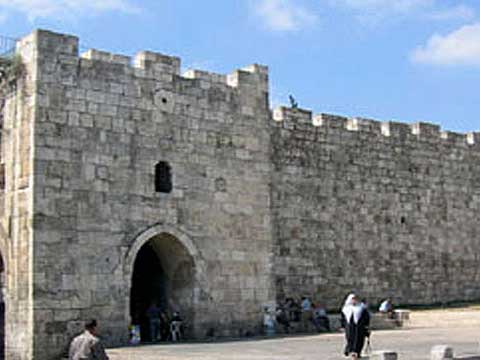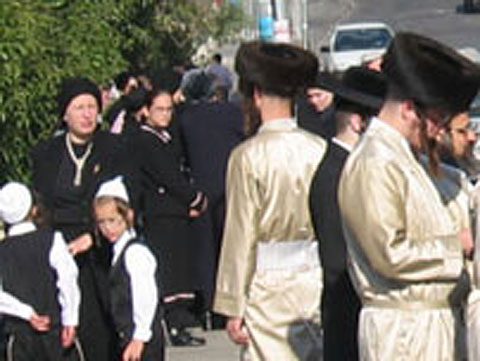
Mea Shearim Ultra-Orthodox Jewish Neighbourhood
An insular neighbourhood in the heart of Jerusalem, once populated by “progressive” thinkers who dared to reside outside the walled city, today’s residents of Mea Shearim are very conservative. Mea Shearim translates to 100 Gates and according to tradition, the community originally had 100 gates. Mea Shearim was founded in 1874 by a building society of a hundred shareholders. It was named after a verse from Genesis (26:12) which was the Torah weekly portion when it was established. It is structed as a courtyard neighborhood whose gates could be locked every night. The common language is Yiddish, and life revolves around adherence of Jewish religious law. Men are dressed in black suits and a white shirt. Women wear a long skirts and sleeves. Married women cover their hair or use a wig. The Yiddish, the local dress code, and the street posters make a visit to Mea Shearim feel like going through an Eastern European Shtetl. Although open to all, big signs in English and Hebrew urge visitors to follow a modest dress code. Visitors, particularly women, should arrive “modestly” dressed- legs, shoulders and elbows should be covered. During Shabbath the streets are closed for motorized traffic, and visitors are requested to refrain from taking photos or using mobile phones.
An insular neighbourhood in the heart of Jerusalem, once populated by “progressive” thinkers who dared to reside outside the walled city, today’s residents of Mea Shearim are very conservative. Mea Shearim translates to 100 Gates and according to tradition, the community originally had 100 gates. Mea Shearim was founded in 1874 by a building society of a hundred shareholders. It was named after a verse from Genesis (26:12) which was the Torah weekly portion when it was established. It is structed as a courtyard neighborhood whose gates could be locked every night. The common language is Yiddish, and life revolves around adherence of Jewish religious law. Men are dressed in black suits and a white shirt. Women wear a long skirts and sleeves. Married women cover their hair or use a wig. The Yiddish, the local dress code, and the street posters make a visit to Mea Shearim feel like going through an Eastern European Shtetl. Although open to all, big signs in English and Hebrew urge visitors to follow a modest dress code. Visitors, particularly women, should arrive “modestly” dressed- legs, shoulders and elbows should be covered. During Shabbath the streets are closed for motorized traffic, and visitors are requested to refrain from taking photos or using mobile phones.
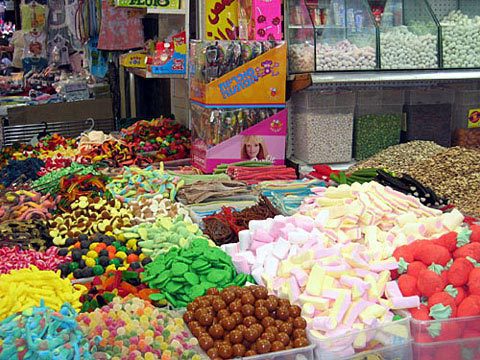
Old City Market
With a distinctive Arabian nights feel to it, the Arab market – or souq – located in the Christian and Muslim Quarters of the Old City is a labyrinth of alleyways lined with shops selling everything from handmade jewelry and exotic scarves to hookahs and ceramics.
With a distinctive Arabian nights feel to it, the Arab market – or souq – located in the Christian and Muslim Quarters of the Old City is a labyrinth of alleyways lined with shops selling everything from handmade jewelry and exotic scarves to hookahs and ceramics.
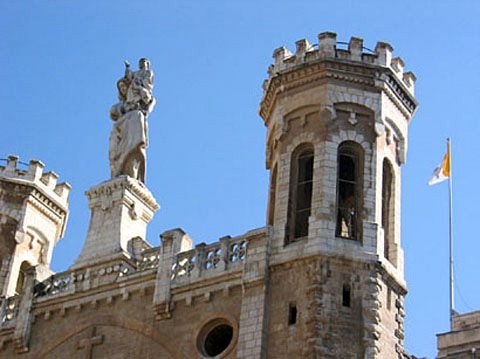
Notre Dame Church
In the early 1880s, this plot of land served as a campsite for a large group of French pilgrims. In 1887, the Catholic Assumptionist Fathers built the church. Sculptures of the Madonna and Child are carved between the twin stone towers, which serve as a landmark. Mass is held daily. You can inquire about the time of the daily mass at the Olive Tree Hotel’s reception desk or make a reservation for a group mass.
In the early 1880s, this plot of land served as a campsite for a large group of French pilgrims. In 1887, the Catholic Assumptionist Fathers built the church. Sculptures of the Madonna and Child are carved between the twin stone towers, which serve as a landmark. Mass is held daily. You can inquire about the time of the daily mass at the Olive Tree Hotel’s reception desk or make a reservation for a group mass.
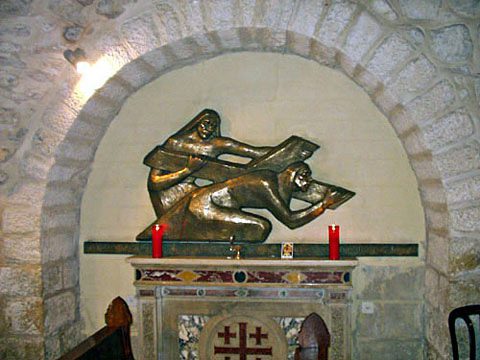
Station Five and Station Seven of the Via Dolorosa
A Franciscan chapel commemorating “Simon of Cyrene Picks up the Cross for Jesus” and a Franciscan chapel commemorating “Jesus Falls for the Second Time”, respectively.
A Franciscan chapel commemorating “Simon of Cyrene Picks up the Cross for Jesus” and a Franciscan chapel commemorating “Jesus Falls for the Second Time”, respectively.
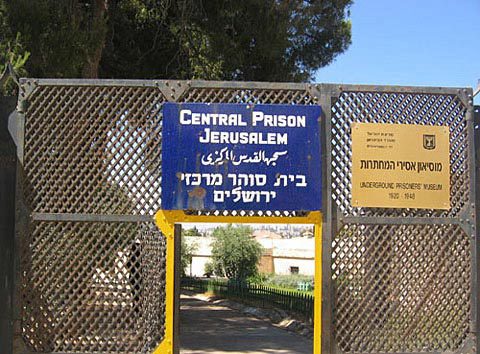
Underground Prisoner Museum
The museum is situated at the building of the “Russian Women Pilgrims Hostel”, built in 1864, as part of the Russian Compound. The hostel was converted into a central prison during the British Mandate. The museum commemorates activities of the Haganah, Etzel and Lehi movements in pre-state Israel.
The museum is situated at the building of the “Russian Women Pilgrims Hostel”, built in 1864, as part of the Russian Compound. The hostel was converted into a central prison during the British Mandate. The museum commemorates activities of the Haganah, Etzel and Lehi movements in pre-state Israel.
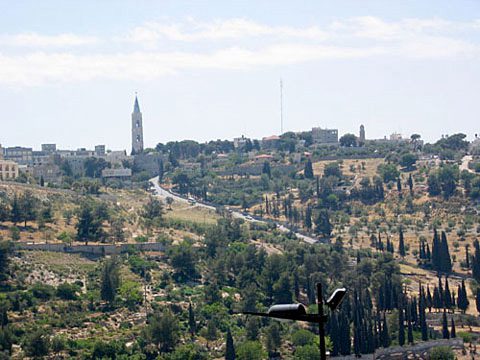
View of the Mount of Olives, Augusta Victoria and the Church of Acension
Located in the northeast corner of the Old City wall (the Storks Tower), here you can admire views of the Mount of Olives, Augusta Victoria and the Church of Ascension, in all their glory.
Located in the northeast corner of the Old City wall (the Storks Tower), here you can admire views of the Mount of Olives, Augusta Victoria and the Church of Ascension, in all their glory.
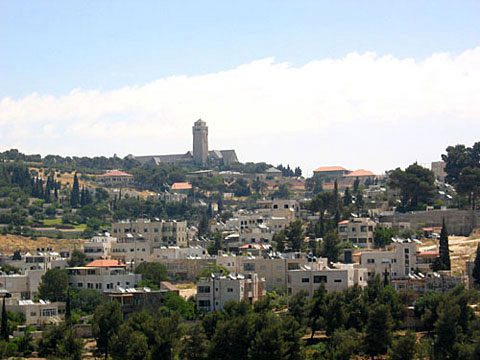
View of the Mount of Olives and Augusta Victoria
From the northeast corner of the Old City wall (the Storks Tower) there is a magnificent view of the Mount of Olives and Augusta Victoria.
From the northeast corner of the Old City wall (the Storks Tower) there is a magnificent view of the Mount of Olives and Augusta Victoria.
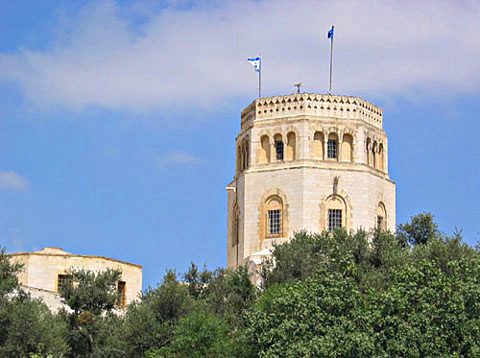
Rockefeller Museum of Antiquities
The museum opened in 1938 thanks to a million-dollar donation by John D. Rockefeller and houses antiquities uncovered in digs by around the country including Beit Shean, Megiddo, and Samaria. If you wish to check current museum opening hours, please ask at the Olive Tree Hotel’s reception desk.
The museum opened in 1938 thanks to a million-dollar donation by John D. Rockefeller and houses antiquities uncovered in digs by around the country including Beit Shean, Megiddo, and Samaria. If you wish to check current museum opening hours, please ask at the Olive Tree Hotel’s reception desk.

